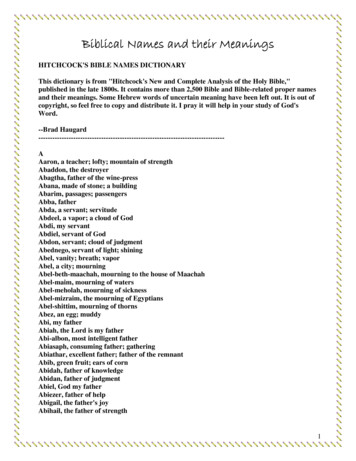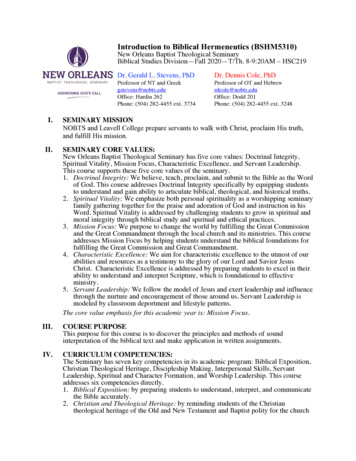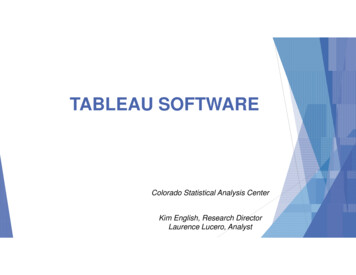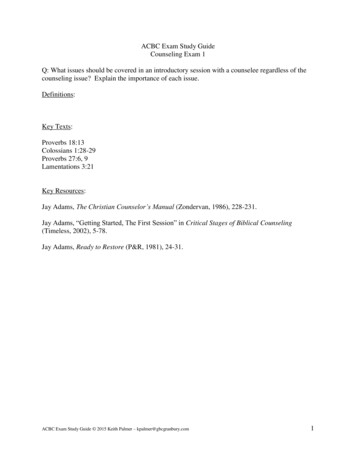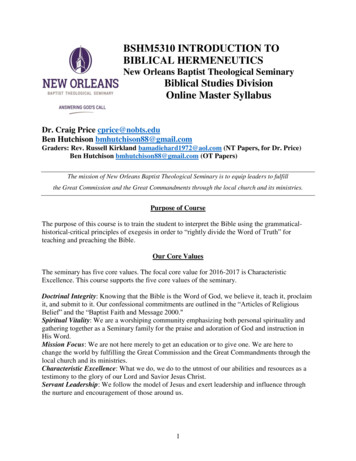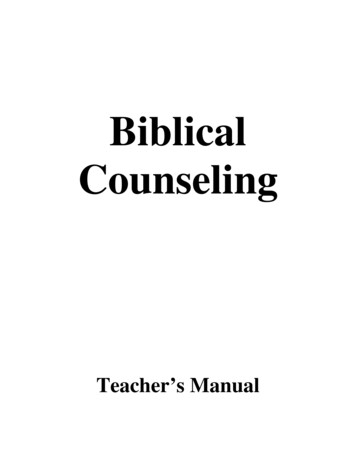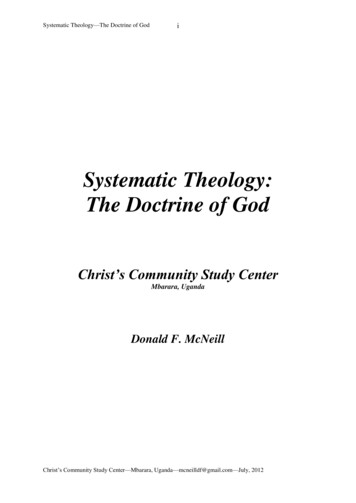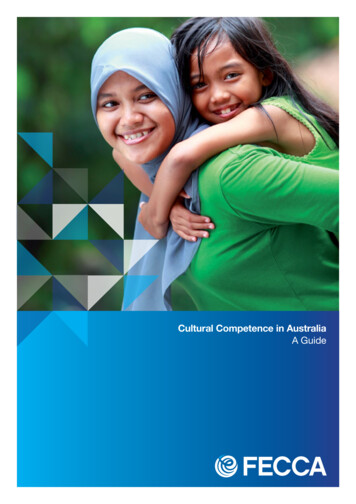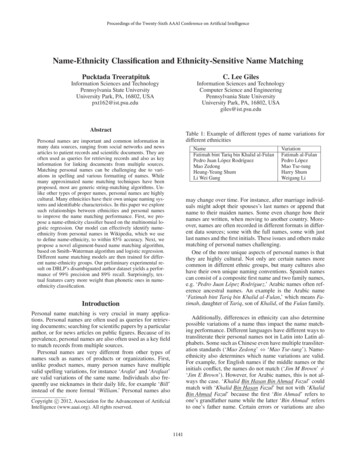
Transcription
2
ëAņŖŠŸŶ ëŸǬă ųǫĈŖŠŸ ëģǖþƭŦǐë Ĉîė ƻûų ûŸǰĈŘɈŃûǘŦŵŖŠŸ ŃINjĔĘ ƐĐĘřĘ ŃǯřŠǯŖŠŸ ƐńĐ ĘĀ ŖîĨ ĀĘǮŶŠŸŸEŶģĐņëŸɅ3
4
We present our many thanks to Our God-Fatherand to Our King of Kings, to His ImperialMajesty, HAILE SELLASSIE I’s Kingdome in theGlorious name of Iyesus Kristos, Our Saviour –Our Lord of Lords.AMEN AND AMEN.5
6
THE BIBLE SOCIETY OFHIS IMPERIAL MAJESTY (BSHIM)PUBLISHED BY: H.H. RAS IADONIS TAFARI,& H.H. WOIZERO TEHETENA GIRMA-ASFAWOF THE LION OF JUDAH SOCIETY (LOJS)IMPERIAL PUBLISHERS TO THE H.I.M. UNIVERSITIES, COLLEGES &CHRISTIAN [TEWAHEDO] CHURCHES 1991-2011 BSHIM-LOJ7
2011 by LION OF JUDAH SOCIETY PUBLISHERS &PRINTING PRESSAll rights reserved. No part of this publication may bereproduced or transmitted for commercial purposes,except for brief quotations in printed reviews, withoutwritten permission of the publishers’.Churches and other noncommercial interests mayreproduce portions of this book without the expresswritten permission of the LOJS PRINTING PRESS, providedthat the text does not exceed 500 words and that the text isnot material quoted from another publisher. Whenreproducing text from this book, include the followingcredit line: “From the Amharic Book of Ruth, Atranslation & interpretation by Ras Iadonis Tafari,published by the Lion of Judah Society. Used bypermission.”All English-language scripture quotations, unlessotherwise noted, are taken from the King James Versionof the 1611 A.D. Holy Bible [KJV].All Amharic-language scripture quotations, unlessotherwise noted, are taken the Emperor’s Bible, the1961/2 A.D. Authorized H.I.M. HAILE SELLASSIE IRevised Amharic Bible [RAB].Published by the Lion of Judah Society,www.lojsociety.orgOur mission is to bring good tidings, that publishethpeace; that bringeth good tidings of good, that saith toZion, Thy God reigneth. – Isaiah 52:7Printed in the United States of America.8
9
10
ADICTIONARYOFANCIENT & BEAUTIFULBIBLICAL NAMESIN THE RoyalAMHARICWITH ENGLISHTRANSLATIONS & NOTES*Including Many Rare & Meaningful Namesnot Found in Other Amharic Name BooksCompiled by: Tehetena Girma-AsfawCo-Edited by: Ras Iadonis TafariPresented byTHE LION OF JUDAH SOCIETY11
Are You Still Searching For YourNew & True Amharic Name?Find out more online:How do I go about legally changingmy old name?Visit us online:www.LOJSociety.Org/lojfiling12
TABLE OF CONTENTSForeword by Ras Iadonis Tafari What’s In A Name?Introduction to the 1st EditionComparison Quotation:Proverbs 22:1 [KJV & HIS]Biblical Names in Amharic – ABiblical Names in Amharic – BBiblical Names in Amharic – CBiblical Names in Amharic – DBiblical Names in Amharic – EBiblical Names in Amharic – FBiblical Names in Amharic – GBiblical Names in Amharic – HBiblical Names in Amharic – IBiblical Names in Amharic – JBiblical Names in Amharic – KBiblical Names in Amharic – LBiblical Names in Amharic – MBiblical Names in Amharic – NBiblical Names in Amharic – OBiblical Names in Amharic – PBiblical Names in Amharic – QBiblical Names in Amharic – RBiblical Names in Amharic – SBiblical Names in Amharic – TBiblical Names in Amharic – UBiblical Names in Amharic – VBiblical Names in Amharic – W, xBiblical Names in Amharic – YBiblical Names in Amharic – Zpage 15page 17page 19page 23page 25page 51page 60page 66page 72page 90page 91page 96page 111page 121page 160page 167page 174page 192page 202page 206page 214page 214page 222page 252page 261page 263page 264page 264page 26413
14
FOREWORDIn writing this briefly composed, yet heartfelt foreword onbehalf my lovely sister-wife, my co-labourer in ministryand the compiler of the present volume, entitled BiblicalNames in Amharic, Wzo. Tehetena Girma-Asfaw’s veryfirst published work, I am quite pleased and honoured toalso mention the great service, and no doubt benefit, thatthis Amharic Book of Biblical Names will be to allEthiopians at home and abroad; with a special dueemphasis to all those sincere Rastafarians, Ethiopians athome and abroad, including the Black Jews, or Hebrewsof the diaspora in the Western hemisphere who have longrequested such a well-researched, documented and editedpreliminary volume for quite some time.An overview is here in order: namely, that this presentedition was in a pre-production status for several yearsnow, while a diligent in-gathering of many factual piecesof available information was compiled and subsequentcomparisons made alongside the H.I.M. Amharic Biblehas eventually been achieved as a basic prerequisite forthe inclusion of each and every name included in thisbook. Thus, the names, definitions and related data hereinhas gone through several necessary updates and a fewrevisions over the years in order to be as thorough,complete and useful as possible: including detailedexplanations, transliterations for pronunciation and avariety of biblical references for a better contextual clarityof the persons who have given, in part or whole, acharacter to a particular name.Although somewhat exhaustive, it is easy-to-read and aprerequisite study for the newcomer as well as the moreadvanced student of the bible. The dictionary-like entriesare also highly accurate, verifiable and reliable due to thefact that it is based upon the general etymologicalevidences available from a combination of sources,namely – the biblical Hebrew, New Testament Greek and15
archaic Amharic. Names that are found in the pages of theRevised Amharic Bible published by H.I.M. HaileSellassie I’s Authorized version of 1961A.D. do notalways agree with the King James Version or otherEuropean recessions of the ancient scriptures. This hasbeen noted when and where there have been suchdifferences in rendering and duly noted in connectionwith the name. More could be said, however, speculativematters have been omitted for the sake of the simplicity offacts easily verifiable herein.Therefore, we can confidently say that all, or the vastmajority, of the information accompanying each of theindividual names found in this dictionary, is in agreementwith first-hand, second-hand and other related bibleresource materials, dictionaries and biblical concordancesreadily available to the reader in a variety of otherdocuments, ancient and modern.So, without further ado, we are happy to finally presentone of the most complete to date Dictionaries of theANCIENT & BEAUTIFUL BIBLICAL NAMES IN THE RoyalAMHARIC WITH ENGLISH TRANSLATIONS & NOTES, alongwith many rare & meaningful names not found in otherso-called Amharic Name Books. This, in and of itself, is agreat and noteworthy achievement that assists the presentand future generations of Ethiopian-Hebrews, at homeand abroad in choosing a good name. May the Almightybless and prosper this work of our hands and heart. Amenand Amen.RAS IADONIS TAFARIJune 2011,Kings County, New York16
What’s In A NAME?Jesse. Thomas. Oprah. Naomi.Levi. Abigail.Tabitha. Neariah. Rebekah. Nathan. Matthew.Shiloh. Michael. Zemira. Abner. Jacob.Noah. Andrew. Sheva. Samuel. Imlah. Eden.Hannah. Hodiah. David. Jarah. Nicholas.Mahlah. Barnabas. Joshua. Zebina. Silas.Peter. Caleb. Jonathan. Dinah. Philip. Linus.Candace. Gabriel. Lydia. Sharon. Uriah.Timothy. Leah. Elijah. Ascah. Benjamin.Phoebe. Aaron. Zia. Joanna. Rufus. Seth.Luke. Eli. Josiah. Chloe. Priscilla. Kenan.Cyrus. Rachel. Keren. Elizabeth. Saul.Sarah. Korah. Susanna. persons, places, things, ideas?READ more & Find THE TRUTHfor yourself .17
18
IntroductionA book about biblical names is confronted by certaindifficulties, not least the problem of spelling. The namesin this book are mostly the anglicised forms of ancientETHIOPIC / Royal AMHARIC, biblical Hebrew andSeptuagint (or, Koine) Greek names. Different translatorshave at various times preferred different forms –sometimes quite markedly so. With such variants, wehave tried our utmost to chose and present the mostpopular form, or those that are most likely to be easilyrecognised by the average reader.The original Bible sources that we have used here are: theFirst Haile Selassie Amharic Bible, King James Version(KJV), the Revised Standard Version (RSV), and the NewInternational Version (NIV). The KJV, RSV and NIV aresaid to be amongst the most noted and oft-quotedtranslations of the Bible in English. All of the names inthis book may be found in the H.I.M. Haile Selassie IRevised Amharic Bible, although some, such asAlexander, are known from other historical sources aswell. Very obscure biblical names, or those unlikely to beof any significant modern appeal, have been excluded.For each name, a brief history is sketched of the person orpersons who held it, beginning with the earliest bearer tothe latter. Each entry is also supported by a citationshowing the earliest known use of the name in the Bible.GendersA boy or girl of today might be given many biblicalnames with little regard to the original gender of thename. In fact, many parents are already doing this: if they19
like a name, they use it - and they do not allow a smalldetail like sex or gender stand in their way! Names are notalways gender specific, but rarely may be. However, mostpeople today are quite happy with Oprah as a femalename. It is a unisex name, used by both males in ancienttimes and today by a famous African-American celebrity.Besides, there are also biblical names such as Daniel,traditionally masculine, that have been adapted into lovelyfemale versions such as Danielle.The following terms are used throughout this book toindicate name genders:(female) . a name used in the Bible for female charactersonly, and recognised by most people today as anexclusive or mainly female name.(male) . a name used in the Bible for male charactersonly, and recognised by most people today as anexclusive or mainly male name.(traditionally male and female) . a name used in theBible for both male and female characters; that is, atraditionally unisex name.(modern male and female) . a name that has been used inmodern times for both boys and girls, with either auniform spelling or varied spelling, or a name that haspotential as a modern unisex name (such as Oprah).ConcubinesMany biblical women are described as concubines. In the20
polygamous society of the ancient Hebrews, concubinagewas not considered immoral. Concubines were simplywives of lower or secondary status. Many of them wereslaves or foreign captives of war, though free Hebrewwomen could and did elect to become concubines.Sometimes a childless wife would offer her husband oneof her slaves or maids as a concubine: in the hope ofgetting an heir. Some famous biblical triangles of thistype existed, including Rachel and Jacob with theconcubine-wife Bilhah; and Sarah and Abraham with theconcubine-wife Hagar.PronunciationA simple phonetic pronunciation key is provided forsounding out the Amharic names given in this book. Thekey also offers possibilities for correct pronunciation.VariantsThe variants are of two types: (i) common spelling formsin different English translations of the Bible, and (ii)popular derivatives and alternates: including selectedforeign language derivatives and alternates. It isimportant to note that some of the variants may not beonly biblical, but pre and post-biblical in origin orderivation. An example of this occurs with the nameElizabeth, where one of the variants is given as Isobel(?).Some sources claim that this is merely a medievalSpanish variant of Elizabeth's earlier forms. However,others say that Isobel is from a completely different root,21
and may be Roman-Egyptian in origination1. If you wishto be certain of choosing a biblical name - that is, a namewhich appears in the Bible, our advise is simply – do notchoose a variant. Stick with the main name for each entry.We have provided of plenty of them to choose from.Remember, the words of Proverb 22, Verse 1 that wiselyadvises: “A good name is rather to be chosen than great riches,and loving favour rather than silver and gold.”TEHETENA GIRMA-ASFAW,EDITOR-IN-CHIEFPOSTSCRIPT: An additional note of thanks must be gratefullymade to my co-labourer in these labours of love, my brotherhusband – RASIADONIS TAFARI, who took the time andpatience to proofread, co-edit and further annotate many of theinitial name entries in this edition along with variousalternative transliterations and transcriptions (mainly in thebracketed portions) to the basic ones given after the simplifiedAmharic-to-English pronunciation guide that I have providedfor the respective user in search of a good Amharic Bible name.1If this is the case, the suggested meaning would be translated as "beautifuldaughter of Isis."22
HSV2ûȠóȫ ĀĖï 221 ûðƎĀ ĘĀ ƋňƼ ņëȃǰųŘ ǐĞîðɈ ûðƎĀĀ āǫĘ ƋňĐŶ ƋƫĐĨ ǐŃðȆðɅKJVTHE BOOK OF PROVERB 221 A good name is rather to be chosenthan great riches, and loving favourrather than silver and gold.2HSV stands for the “Haile Selassie Version,” or the Revised Amharic Bible,also known as the H.I.M. Haile Selassie I 1961/62 A.D. Authorized AmharicBible called the “Emperor’s Bible.”23
24
A Aaron arr-ron (as in arrow) (male)AđŸ Aron / ArronHebrew: Enlightener, teacher. Other interpretations:Mountain, messenger. Eldest son of Amram andJochebed. His brother was Moses and his sister wasMiriam. Aaron was the divinely-appointedspokesman of Moses, and he persuaded theIsraelites to trust his brother. He also became thefirst high priest of the nation. His low point camewhen Moses climbed Mount Sinai to get the TenCommandments. While Moses was gone, theIsraelites made an image of a calf to worship. Aarondid not stop them. The excuse he gave to Moseswas unconvincing (but very human): "They gave methe gold, and I threw it into the fire, and out camethis calf!" His wife was Elisheba and his sons wereNadab, Abihu, Eleazar and Ithamar. Variants:Aharon, Ahron, Arend, Ari, Arny, Aron, Haroun, Ron,Ronny. [Exodus 4:14] OčŘ ƻțAŘɅ ĀEĎȰ 4Ʌ14ɇAbdeel ab-deel (male)ƶňǘƇð Abdiel / Abdi’aelHebrew: Servant of God. Father of Shelemiah, anofficial under King Jehoiakim.[Jeremiah 36:26] ŘŸŅœ ƇĐĀǎĘɅ ĀEĎȰ 36Ʌ26ɇAbel a-bel (male)AŇð Abel / AbaelHebrew: Breath, vapour. (May be linked to anAkkadian word meaning son.) Second son of Adamand Eve, the first human parents. Abel was a keeper25
of sheep, the world's first shepherd. He found favourin the eyes of God and was the first human being toplease God after his parents' catastrophic fall fromgrace. Cain, his brother, resented his good standingwith God. In a fit of jealousy, Cain slew Abel, therebymaking him the first murder victim in history.Variants: Abelard, Abeles, Abell, Abi, Able, Hevel,Nab. [Genesis 4:2] OčŘ ƻȰȈċŘɅ ĀEĎȰ 4Ʌ2ɇAbida ab-be-da (male)AŅǖE Abida’i / Abeeda’iHebrew: Father of wisdom, the father knows. Son ofMidian and grandson of Abraham and Keturah,Abraham's second wife. His brothers were Ephah,Epher, Hanoch and Eldaah. Variants: Abidah.[Genesis 25:4] OčŘ ƻȰȈċŘɅ ĀEĎȰ 25Ʌ4ɇAbidan ab-be-dan (male)AŅǖŸ Abidan / AbeedanHebrew: The father will decide. Other interpretations:Father of judgment. A chief of the tribe of Benjamin.Son of Gideoni. [Numbers 1:11] OčŘ ƻŰðİɅĀEĎȰ 1Ʌ11ɇAbiel ab-be-el (modern male and female)AŅƇð Abiel / Abee’aelHebrew: The father is God, God is the father. Otherinterpretations: Father of strength. Son of Zeror.Father of Kish and the grandfather of Saul andAbner. Others with this name: One of David's mightywarriors. Variants: Abi-Albon.[1 Samuel 9:1] ûȠóȫ ĖüƇð ģǖþƭɅ ĀEĎȰ 9Ʌ1ɇ26
Abiezer ab-be-ezer (male)AŅƷǀĐ Abiezir / Abee’aezirHebrew: Father of help, the father is my help. Eldestson of Gilead and a descendant of Joseph. Hisbrothers were Helek, Asriel, Shechem, Hepher andShemida. Others with this name: One of David'smighty warriors. Variants: Iezer, Jeezer, Iezerrm.[Joshua 17:2] ûȠóȫ IǎĔ ƫðǓ ųƯɅ ĀEĎȰ 17Ʌ2ɇAbigail ab-be-gale (female)AŅǰǎ Abigya / AbeegiyaHebrew: Spring of joy. Wife of Nabel. She was wiseand beautiful, but her husband Nabel was an illmannered drunkard. Abigail's discreet hospitalitystopped the great warrior David from killing Nabel,who had insulted him. Nabel later died and Davidmarried Abigail. Her son by David was Kileab.Others with this name: A sister or step-sister ofDavid. This Abigail married Jether the Ishmaelite,and gave birth to Amasa. Variants: Abagael,Abagail, Abbe, Abbey, Abbey, Abbye, Abigael, Gael,Gail, Gale, Gayel, Gayle.[1 Samuel 25:3] ûȠóȫ ĖüƇð ģǖþƭɅ ĀEĎȰ 25ɅAbihail ab-be-hale (modern male and female)AŅƎIð Abika’il / Abeeka’eelHebrew: The father is strength, father of strength. Aclan chief. The father of Zuriel. Others with thisname: (i) Wife of Abishur. Mother of Ahban andMolid. (ii) Son of Huri, a descendant of Gilead. (iii)Daughter of Eliab. She married King Rehoboam ofJudah. (iv) Father of Esther.[Numbers 3:35] OčŘ ƻŰðİɅ ĀEĎȰ 3Ʌ35ɇ27
Abijah ab-be-jar (traditionally male and female)AŅǎ Abeeya / AbiyaHebrew: God is father, whose father is God.Seventh son of Beker and a grandson of Benjamin.Others with this name: (i) Second son of Samuel, thegreat Hebrew prophet. He became a judge of Israelbut proved unworthy of high office. (ii) A descendantof the first high priest Aaron, and an ancestor ofJohn the Baptist. (iii) A son of King Jeroboam. Hedied in childhood, fulfilling a prophecy that claimedhe would. (iv) Son of King Rehoboam. Hesucceeded to the throne of Jerusalem andattempted to unite the Twelve Tribes of Israel, as hisgreat-grandfather David had done. Reigned for threeyears, and in the end became corrupted. (v) Themother of Hezekiah, a king of Judah. (vi) Two priestshave this name in the Book of Nehemiah. Variants:Abi, Abijam. [1 Chronicles 7:8] ûȠóȫ ƿŶ ûƮEðģǖþƭɅ ĀEĎȰ 2Ʌ24ɇAbiram ab-be-ram (male)AŇđŸ Abaeron / AberonHebrew: High father, the father is exalted, greatest.Son of Eliab the Reubenite. With Korah and Dathan,Abiram conspired against Moses. For this crime theearth swallowed him. Others with this name: Eldestson of Hiel the Bethelite, who rebuilt Jericho: "he laidthe foundation thereof in Abiram his firstborn."[Numbers 16:1] OčŘ ƻŰðİɅ ĀEĎȰ 16Ʌ1ɇAbishagAŅĖŸ Abeesan / AbisanHebrew: “My Father was a wonderer”[1 Kings 1:3] ûȠóȫ ųǫĈŘ ģǖþƭɅ ĀEĎȰ 1Ʌ 3ɇ28
Abishai ab-be-shay (modern male and female)AŅĖ Abisa / AbeesaHebrew: Father of gifts, gift of the father. The son ofZeruiah, David's sister. He offered to kill Saul forDavid, saying, "God hath delivered thine enemy intothine hand this day." He defeated the Edomites andrescued David from a fight with a Philistine giant.Variants: Abisha. [1 Samuel 26:6] ûȠóȫ ĖüƇðģǖþƭ ĀEĎȰ 26Ʌ6ɇAbishua ab-be-shoo-ar (modern male and female)AŅĔ Abeesu / AbisuHebrew: Father of deliverance, salvation. Otherinterpretations: The father is noble. Son of the priestPhinehas. Others with the name: Son of Bela.[1 Chronicles 6:4] ûȠóȫ ƿŶ ûƮEð ģǖþƭɅ Ā.6Ʌ4ɇAbital ab-be-tal (female)AŅȆð AbeeTal / AbitalHebrew: The father is dew, like the dew. One of KingDavid's wives. She was the mother of Shephatiah,the fifth son of David.[2 Samuel 3:4] ûȠóȫ ĖüƇð Ǝð ĀEĎȰ 3Ʌ 4ɇAbner ab-ner (male)AŃŷĐ Abenaer / AbenerHebrew: The father is a lamp, father of light. A sonof Ner. Nephew of Kish and cousin of Saul. He waschief commander of Saul's military forces. AfterSaul's demise, Abner wanted Ish-Bosheth, Saul'sson, to assume the throne. But David also soughtthe kingship. Abner was defeated by David at thepool of Gibeon. Shortly after, he swung his support29
behind David. Abner was killed by Joab, the chiefcommander of David's army. Variants: Ab, Abbey,Abby, Abiner, Avner, Eb, Ebbey, Ebby, Ebner.[1 Samuel 14:50] ûȠóȫ ĖüƇð ģǖþƭ Ā.14Ʌ50ɇAbraham ab-ra-ham (male)AňĐæĀ Abirham / AbrhamHebrew: Father of many, father of a multitude, fatherof the cosmos. Son of Terah and a descendant ofShem, eldest son of Noah. His original name wasAbram, which in Hebrew meant high father orexalted father. This was changed by God, who said,"No longer shall your name be Abram, but yourname shall be Abraham, for I have made you thefather of many nations". Abraham's first wife was hishalf-sister Sarai, renamed Sarah by God. He hadeight sons: Ishmael, his first born, to the Egyptianconcubine Hagar; Isaac, his beloved second sonand heir, to Sarah; and Zimran, Jokshan, Medan,Midian, Ishbak and Shuah, the sons of his latteryears, to his second wife Keturah. Abraham had twobrothers, Nahor and Haran. He died at the age ofone hundred and seventy-five years and was buriednext to Sarah. He is recognised widely as the fatherof the Jewish and Arabian nations. Variants: Ab,Abe, Abi, Abrahan, Abram, Abramo, Abran,Avraham, Avram, Avrom, Bram, Ham, Ibrahim.[Abram - Genesis 11:27, Abraham - Genesis 17:5]OčŘ ƻȰȈċŘ ĀEĎȰ 17Ʌ5ɇAbram ab-ram (male)AňĎĀ Abiram see Abraham[Abram - Genesis 11:27] OčŘ ƻȰȈċŘ ĀEĎȰ 11Ʌ27ɇ[Abraham - Genesis 17:5] OčŘ ƻȰȈċŘ ĀEĎȰ 17Ʌ5ɇ30
Absalom ab-sal-lom (male)AŇėñĀ Abaesaelom / AbeselomHebrew: Father of peace. The tragic third son ofKing David. His mother was Maacah and his sisterwas Tamar. Absalom plotted to usurp his father, whomet his forces in battle and defeated them. Inseeking to escape, Absalom's head became caughtin the branches of an oak tree, perhaps ensnared byhis abundant hair. When Absalom had his yearlyhaircut, says the Bible, "he weighed the hair of hishead at two hundred shekels" (about six pounds or2.7 kilograms). He was killed by David's men as hehung in the tree, despite David's orders that he betaken unharmed. David's grieved deeply for hisrebellious son. Variants: Abishalom, Absolom.[1 Kings 15:2] ûȠóȫ ųǫĈŘ ģǖþƭɅ ĀEĎȰ 15Ʌ2ɇAdah a-da (female)ƶǖ Ada / AddaHebrew: Beauty, ornament. First wife of Lamech, theother being Zillah. Ada (or Adah) had two sons,Jabal and Jubal. Hers is the second woman's nameto appear in the Bible, after Eve. Others with thisname: A wife of Esau and the daughter of Elon theHittite. Esau also had a wife called Basemath, whichmay have been just another name for Ada. In anycase, her son was Eliphaz. Variants: Adah, Adena,Adina, Dena, Dina. [Genesis 4:19] OčŘ ƻȰȈċŘĀEĎȰ 4Ʌ19-23ɇAdalia ada-li-ar (modern male and female)ŃĐǎ BeriyaHebrew: Fire-god. One of the ten sons of Haman theAgagite killed by the Jews. His brothers were31
Parshandatha, Dalphon, Aspatha, Poratha, Aridatha,Parmashta, Aridai, Arisai and Vaizatha.[Esther 9:8] ûȠóȫ AĘŗĐɅ ĀEĎȰ 9Ʌ8ɇAdam ad-dam (male)AǖĀ Adam / AddamHebrew: Earth, red earth, taken from the red earth,or (in a general sense) man, humanity. The firstperson created by God to live in the garden of Eden.His wife was Eve. The meaning of the name Adam issomewhat uncertain. In the Bible, the name is usedin two different senses: firstly as the name of aperson, and secondly, as a broad name for allmankind. Adam participated in the first sin when,following Eve's example, he ate the fruit of the treethat God had commanded them not to eat. For this,Adam and Eve were expelled from Eden andsubjected to the curse of work, sorrow and death.Adam had three sons, Cain, Abel and Seth. He livednine hundred and thirty years. Variants: Ad, Adamo,Adamson, Adan, Adao, Addison, Addos, Adekin,Adom, Edom. [Genesis 3:17] OčŘ ƻȰȈċŘ Ā.3Ʌ17ɇAddi ad-di (male)óǕ Hadee / Hadi / HaddiGreek, from Hebrew: Adorned. Other interpretations:My witness. An ancestor of Joseph, husband ofMary, the mother of Jesus Christ. Variants: Addei.[Luke 3:28] NjìĦĘ ƫŸǯð ĀEĎȰ 3Ʌ28ɇAdiel ad-de-el (modern male and female)ƶǕƷð Adeeael / Adee’ael / Adiel / Adee’ElHebrew: Ornament of God. A descendant of32
Simeon, the son of Jacob and Leah. Others with thisname: (i) The priestly son of Jahzerah (ii) The fatherof Azmaveth, who rose to high office as King David'streasurer. [1 Chronicles 4:36] ûȠóȫ ƿŶ ûƮEðģǖþƭɅ ĀEĎȰ 4Ʌ36ɇAdin ad-deen (male)ƶǕŸ Adeen / Addeen / AdinHebrew: Delicate. The head of an important familythat returned to Jerusalem with Zerubbabel fromcaptivity in Babylon. Others with this name: Anunknown Adin whose sons returned from captivitywith Ezra. [Ezra 2:15] ûȠóȫ EǀĎɅ ĀEĎȰ 2Ʌ15ɇAdina ad-deen-ar (modern male and female)ƶǕŶ Adeena / AddeenaHebrew: Slender. A captain in David's army.[1 Chronicles 11:42] ûȠóȫ ƿŶ ûƮEð ģǖþƭɅĀEĎȰ 11Ʌ42ɇAdnah ad-nah (male)ƶǘŶ Adina / AadinaHebrew: Pleasure. A captain in Saul's army whowent over to David's side. Others with this name: Acaptain in Jehoshaphat's army.[1 Chronicles 12:20] ûȠóȫ ƿŶ ûƮEð ģǖþƭɅĀEĎȰ 12Ʌ20ɇAdoni-bezek ad-don-ni (male)AǙŵŇƿĨ AdoneebaezaeK / Adonibezek /AdonibaezaekHebrew: Lord. King of Bezek, captured by the men33
of Judah and Simeon after his defeat in battle. Hesuffered the grisly punishment of having his thumbsand big toes cut off. Adoni was a fan of thisparticular form of ritual humiliation and used it on hisown enemies. His full name was Adoni-Bezek (lordof lightning). [Judges 1:5] ûȠóȫ ûĆȰŸŘ Ā.1Ʌ5ɇAdonijah ad-don-nee-jar (male)AǙŸǎĘ AdoniyasHebrew: My lord is God. Fourth son of King David.His mother was Haggith. As the elder sons Ammon,Kileab and Absalom were dead, Adonijah becameheir apparent to the throne. But David selectedSolomon as his successor. Adonijah sought tooverthrow him. He was unsuccessful in this attempt,and forgiven for it. But Adonijah continued to presshis claim. This time there was no clemency:Solomon had him executed. Others with this name:(i) A Levite teacher of the law. (ii) A tribal chiefpresent at the sealing of the covenant. PossibleVariants: Adonikam.[2 Samuel 3:4] ûȠóȫ ĖüƇð Ǝð ĀEĎȰ 3Ʌ4ɇAdriel ad-re-el (modern male and female)ƇĘǘčƇð Aesidireeael / Asidiriel / Aesidiree’AelHebrew: Flock of God, belonging to God. Otherinterpretations: God is my help. Son of Barzillai andson-in-law of Saul. His wife was Merab. He waskilled by the Gibeonites.[1 Samuel 18:19] ûȠóȫ ĖüƇð ģǖþƭ Ā.18Ʌ19ɇAeneas ar-nee-us (male)ƇŸǎ Aeniya / Aenya / Eniya34
Hebrew: Deserving, laudable. A paralysed man atLydda healed by Peter.[Acts 9:33] NjóƮĐǎŘ ĈĎ ĀEĎȰ 9Ʌ33ɇAhab a-hab (male)AƐƶň Akiab / Ak’Ab / AkabHebrew: Uncle. Son of Omri. Seventh king of Israel;reigned for twenty-two years. His wife was Jezebelof Tyre who introduced the blasphemous worship ofthe god Baal and the goddess Ashtoreth to Israel.She also persecuted the true followers of the God ofMoses and urged Ahab to greater evils. He did notneed much urging, however, as he was naturallygreedy. He was killed in battle by a random arrow.According to the Bible, "the dogs licked up his blood,and the harlots washed themselves in it."[1 Kings 16:29] ûȠóȫ ųǫĈŘ ģǖþƭɅ Ā.16Ʌ29ɇAhlai ar-lay (traditionally male and female)Aøîǐ Ahilay / AhlayHebrew: Ornamental, beautiful. Otherinterpretations: O would that! Father of Zabad, asoldier in David's army. Others with this name:Daughter of Sheshan and wife of Jarha, a slavefreed by her father. Mother of Attai.[1Chronicles 11:41] ûȠóȫ ƿŶ ûƮEð ģǖþƭɅ ĀEĎȰ11Ʌ41ɇAkim ar-keem (male)AƍĀ Akeem / AkimGreek, from Hebrew: God will establish. Son ofSadoc. An ancestor of Jesus Christ. Variants:Achim. [Matthew 1:14] NjþŗƱĘ ƫŸǯð ĀEĎȰ 1Ʌ14ɇ35
Alemeth al-le-meth (modern male and female)ƶïÿŘ Alaemaet / AlemetHebrew: Concealment, covering, veil. Son of Bekerand a grandson of Benjamin. Others with this name:A descendant of Jonathan. Variants: Alameth.[1 Chronicles 7:8] ûȠóȫ ƿŶ ûƮEð ģǖþƭɅĀEĎȰ 7Ʌ8ɇAlexander al-lex-zan-der (modern male and female)AïƐĘŸǘđĘ Alaeksindiros / AleksindirosGreek: Defender of men, man-defending. Son ofSimon of Cyrene, the man chosen to help Jesusbear the Cross to Calvary. His brother was Rufus.Others with this name: (i) Kin of Annas the highpriest. (ii) A Jewish convert in Ephesus who spoke tothe crowd. (iii) A false prophet rebuked by Paul. (iv)A coppersmith who sought to harm Paul. Variants:Al, Alastair, Alec, Aleck, Alecksander, Aleksei,Alessander, Alex, Alexis, Alistair, Allister, Sandy,Sasha, Zander. The female forms include Alejandra,Alessandra, Alexandra, Alexandria, Alexia, Alexis,Elke, Sacha, Sandra, Sondra.[Mark 15:21] NjþĐĩĘ ƫŸǯð ĀEĎȰ 15Ʌ21ɇAlmodad al-mo-dad (male)Ƈðāǖǘ Aelimodad / Elimodad / ElimodadHebrew: Beloved. Other interpretations: Infinite,beyond measurement. Eldest son of Joktan. Hisbrothers were Sheleph, Hazarmaveth, Jerah,Hadoram, Uzal, Diklah, Obal, Abimael, Sheba,Ophir, Havilah and Jobab. Founder of an Arab tribe.Variants: El-Mudad. [Genesis 10:26] OčŘ ƻȰȈċŘĀEĎȰ 10Ʌ26ɇ36
Alvan al-van (male)ƶðƮŸ Aliwan / AlwanHebrew: Tall. A son of Shobal and a grandson ofSeir the Horite. His brothers were Manahath, Ebal,Shepho and Onam. Variants: Alian.[Genesis 36:23] OčŘ ƻȰȈċŘ ĀEĎȰ 36Ʌ23ɇAmariah am-ma-ri-ar (modern male and female)AþĐǎ Amariya / Amarya / AmmaryaHebrew: God promises, declares. Father of Ahitub.An ancestor of the great priest, Ezra. Others withthis name: (i) High priest of Jehoshaphat. (ii) ALevite of David's time. (iii) A Levite priest underHezekiah. (iv) A priest with a foreign wife in the timeof Ezra. (v) One of those present with Nehemiah atthe sealing of the covenant. (vi) A priest underZerubbabel. (vii) A son of Hezekiah and greatgrandfather of Zephaniah the prophet.[1 Chronicles 6:7] ûȠóȫ ƿŶ ûƮEð ģǖþƭɅĀEĎȰ 6Ʌ7ɇAmasiah am-ma-si-ar (modern male and female)ƶþĘǎ Amasiya / AmmasiyaHebrew: Whom God bears. Son of Zicri. Hecommanded two hundred thousand "mighty men ofvalour" as a captain under King Jehoshaphat.[2 Chronicles 17:16] ûȠóȫ ƿŶ ûƮEð ƎðEɅĀEĎȰ 17Ʌ16ɇAmaziah am-ma-zi-ar (male)AÿĘǎĘ Amaesiyas / Amesiyas / AmesyasHebrew: Strength of God, whom God strengthens.Eighth king of Judah, which he ruled for twenty-nine37
years. Despite successes and victories, he fell intoerror by worshipping the idols of Edom. He waseventually defeated by Jehoash of Israel andassassinated by conspirators at Lachish. Others withthis name: (i) Father of Joshah. (ii) One of Ethan'sancestors. (iii) A wicked priest of Bethel underJeroboam II. [2 Kings 12:22] ûȠóȫ ųǫĈŘ ƎðEɅĀEĎȰ 12Ʌ22ɇAmmiel am-me-el (modern male and female)ƶýƇð Ameeael / Amiel / Amee’el / Amee’AelHebrew: People of God, my kinsman is God. One ofthe scouts commissioned Moses to "spy out the landof Canaan." Others with this name: (i) Father ofBathsheba, one of David's wives
The original Bible sources that we have used here are: the First Haile Selassie Amharic Bible, King James Version (KJV), the Revised Standard Version (RSV), and the New International Version (NIV). The KJV, RSV and NIV are said to be amongst the most noted and oft-quoted translations of t
